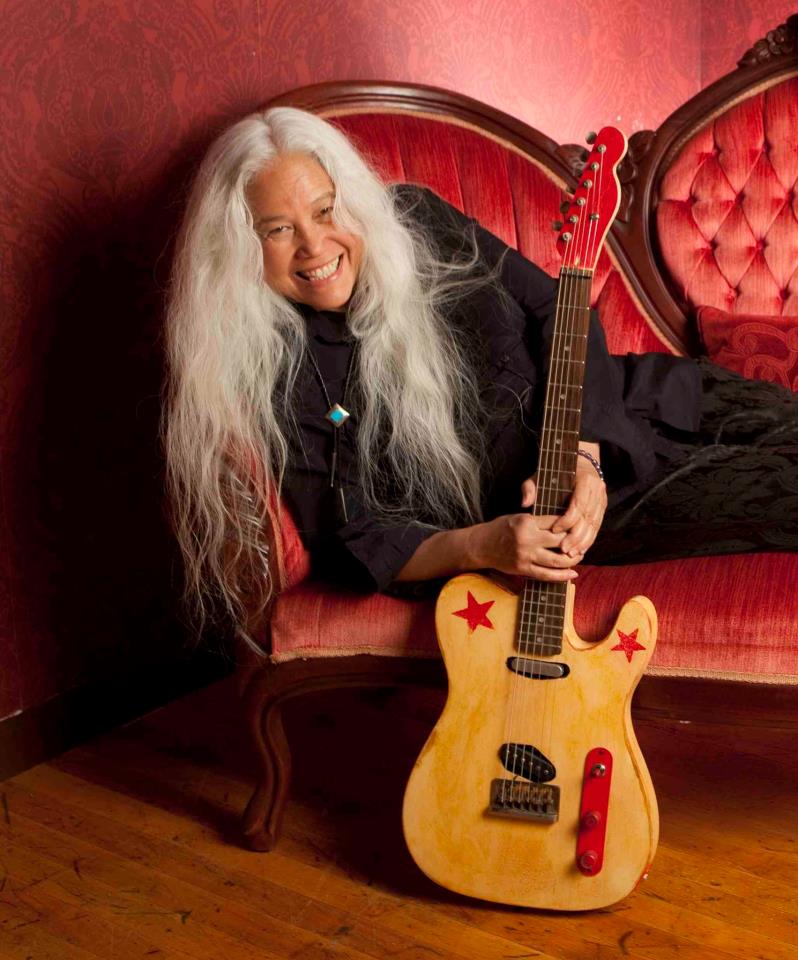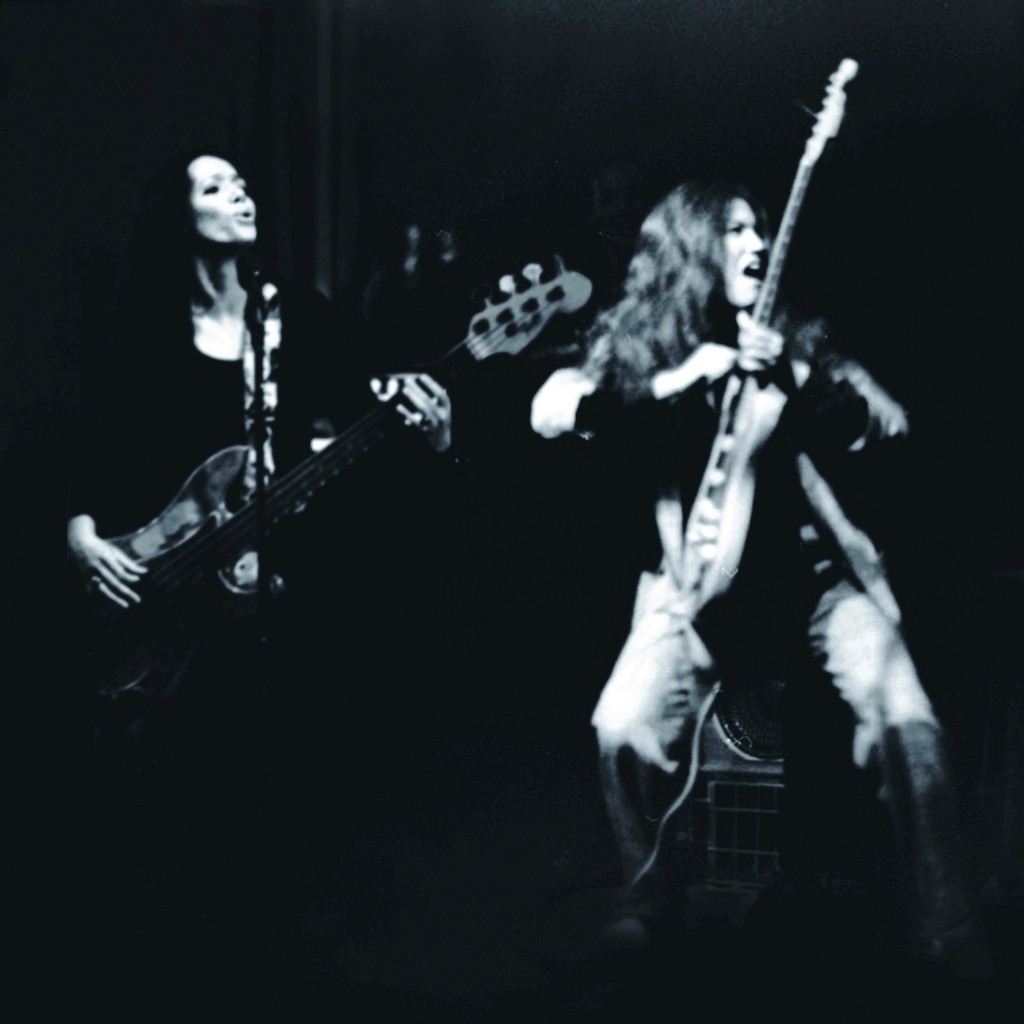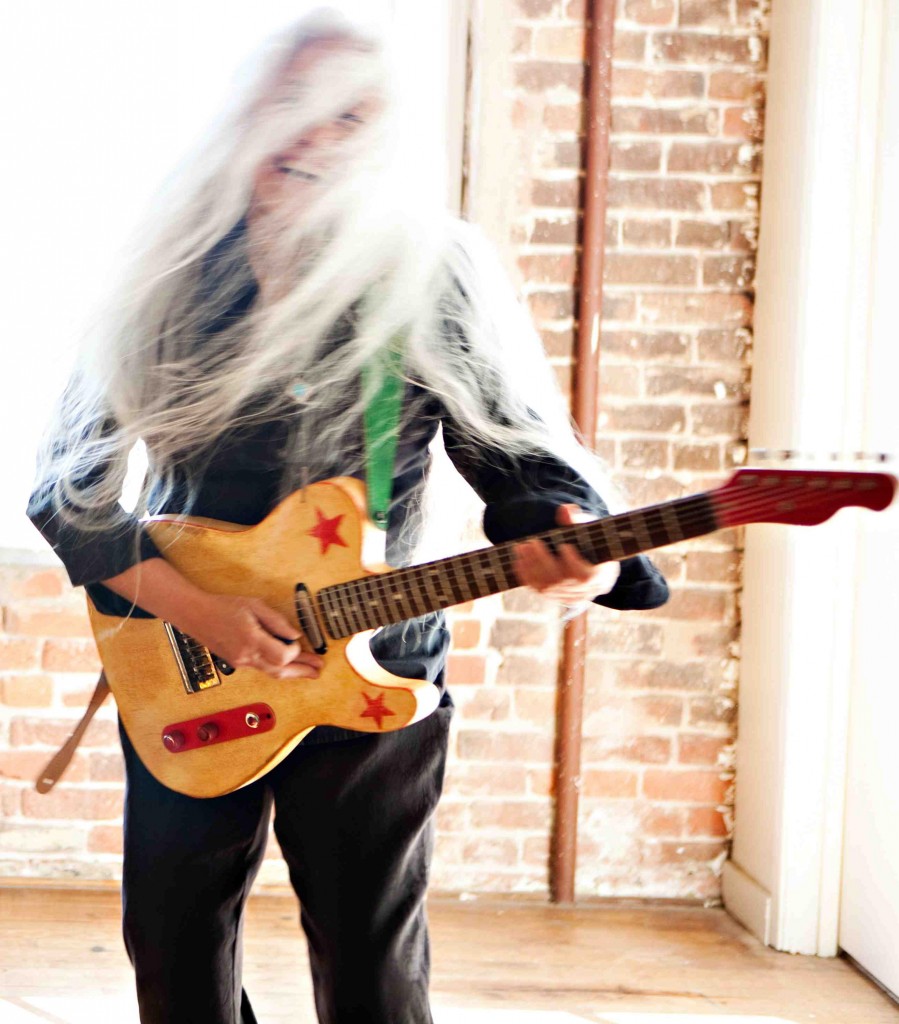The WiMN’s Front and Center is a weekly column that showcases accomplished women who work in the music and audio industries. We spotlight successful female performers, manufacturers, retailers, educators, managers, publicists, and everyone else in between. Want to be featured? Learn how here.
Front and Center: Co-Founder and Lead Guitarist of Fanny, June Millington

By Pauline France
Most musicians have a role model, someone they look up to and whose success they aspire to emulate.
For June Millington, co-founder and lead guitarist of Fanny, that wasn’t the case. She became the trailblazer for today’s female musicians, she set the stage.
But Millington didn’t know what she’d become when she and her sister Jean first started playing music as children in their native country of the Philippines. They were just doing what they loved, and went with it.
The sisters moved to the United States in the ’60s, and eventually became Fanny, one of the first all-female rock bands to be signed to a major label. Their arrival to the U.S. was nothing short of fascinating. The timing was perfect, and so were the circumstances. The band soon began recording and touring worldwide with bands like Chicago and Dr. John, and they even traveled to London to record at the Beatles’ Apple studios to cover their song “Hey Bulldog.” And yes, they got to meet the Beatles!
Enormous success ensued, which we invite you to learn about in our interview with the extraordinary June Millington of Fanny.
WiMN: How old were you and your sister Jean when you first started to play music? What prompted you to start playing?
JM: I played piano for a few years starting around age five and abandoned it in favor of being a tomboy, really, spending my time in trees and eating fresh fruit. Then a cousin turned us on to ukeleles when we were maybe nine or 10, which we took to naturally. We loved learning songs off the radio.
But when I heard a guitar, a couple of months before turning 13, I was smitten. I got one before we left Manila for the U.S. as a birthday present, and Jean took it up too. We were in love! Our guitars meant everything to us. They were our best friends, and music occupied us endlessly.
WiMN: Tell us about your strict Catholic school in Manila. How did that play a key role in guiding your life?
JM: I was only at Assumption Convent for a year, 7th grade. Believe it or not, my handwriting got better there which I think is really good, especially with regard to left brain-right brain coordination, key for playing. They taught an old-style cursive that’s very Spanish (the Catholic Church practically ran the country, and by the way their dogmatism turned me off – pop and rock music spoke much more to me!). And, this is tremendously important: I accidentally heard a young woman playing a guitar on one of my last days there. That totally changed my life, and although I didn’t enjoy my school year there, I suppose it was meant to be. They also taught us how to rigorously study – whether you enjoyed it or not!
WiMN: Your high school band was called The Svelts, and ultimately became Fanny. Can you tell us the origin of the names?
JM: The Svelts came from a word my brother had just learned in school. To be svelte: thin, lithe. It sounded like what we wanted to be, kinda classy! Fanny’s origin came from my hearing about a women’s band in L.A. called Daisy Chain. From that I thought, huh – why not have a woman’s name? From Daisy to Fanny wasn’t such a big jump, Alice had an aunt named Fanny … it was added to the list (there were a lot, maybe 60 and I wish I’d kept the list!) and was the one everyone liked, including producer and management. Short, sweet, had an edge, plus the double-entendre. We could work with that.

WiMN: The years 1969-1971 were pretty extraordinary for Fanny, landing your first record deal, making your first album, playing for Barbra Streisand and even recording at the Beatles’ Apple studios in London. What would you attribute your success to? Did it happen gradually or overnight?
JM: Our success was definitely not overnight, all of us had been working on playing electric (or in Alice’s case, on drums) since around ’64, so we had a work ethic individually and as a group. We were disciplined. And, one detail that seems to be constantly overlooked: when we got to L.A. we could already play. We were bad-ass, we just needed to learn how to record. Which we did as fast as we could and in short order, as Richard Perry basically taught us – and he was tremendously skilled, learning constantly, and was as voracious as we were. We were all into it. It was hard work, but fun. And, actually, he was an excellent teacher. All of L.A. taught us, as we’d hang out in studios and go watch people, or jam, as often as we could. Again, both individually and as a band.
WiMN: Congratulations on successfully funding your upcoming autobiography Land of a Thousand Bridges through Kickstarter! Tell us, when is it due for publication, how candid do you get, and what can readers expect?
JM: It’s very exciting to be moving quickly towards publication, and we’re hoping to be able to take orders before Christmas, at least for the initial printing, through IMA.
I’m very candid, but also circumspect in Land of a Thousand Bridges – it’s a fine balance. I don’t want to overly complain about the hardships and complications, I want to celebrate. This is a story about overcoming and enjoying ourselves to the max, because that is what music does: it gives you wings to fly. So, there you go ~ how did we fly, how high, what did we see?
I talk about growing up in the Philippines (just post-WW II) as it relates to our rock attitude, which was pretty fierce. But my main objective was, and is: tell the truth. How did girls get together and figure our how to be in a band? It was like we took a metaphorical watch apart and put it back together in our image by simply learning music off the radio. Just that. And then playing the songs at gigs, which fortunately were dances, so that was fun. You got lost in it.
I also wanted to talk about music, the purity of it, what attracted us and what gave us the strength to start learning from this astounding melting pot of music that the US has produced. It’s unique in the world, and we were in the middle of that, in the middle of its self-creation.
So in the mix we’re talking racism, feminism, misogyny, etc., all the barriers girls had to break through before there was any positive mirroring for playing in a band. We were determined, goal-oriented, and always picked ourselves up from any perceived setbacks, intent moving forward. That was, and is, the only way to do it.
There are details on life on the road, the incredible double-bills, festivals, T.V. shows, friends we made in the biz, it’s all in there. It’s a unique story, an almost too-fantastic journey. But it did happen. And I was there, so it’s a first-person report.
WiMN: Why did Fanny disband?
JM: It was too much pressure on someone so young, and besides that we were point for all the girls/young women to come. It was grueling and exhausting, you cannot imagine the job – I do describe in the book. There were numerous stages we experienced post going electric in late ’64. Intense, and much fun as well.
I quit first – and I regret that it had to be that way, but there was no other way I was going to survive, I knew. I needed to “become” a person, and I knew I wasn’t going to find what I needed to learn in Hollywood or on the road. That was a tough time.
Fanny went on to do another album with Patti Quatro on guitar, and Brie Berry (whom we played with in high school, in the Svelts) on drums, and it ended up that they had a hit with Jean’s “Butterboy”! I went on the subsequent tour – Fanny’s last – with her in ’75 with Brie on drums, Wendy Haas keys (she’d been in the Svelts too) and a percussionist I’d met in New York, Padi. It was rock but with a funk/disco twist.
WiMN: What do you think of the current music scene? How can aspiring female musicians achieve the success that you did?
JM: I don’t like the music scent too much now, because I don’t like how the underlying business has become more important than the music itself – hence the endless packaging and unsavory media attention, considered to be indispensable. As far as success, work hard and keep at it. There is no other way. If you’re lucky, things will come together. Luck is a big part of it, and so is standing your ground. So, know who you are and be firm in what/who you want to project.
WiMN: Let’s have some fun. What is your favorite song to sing at karaoke?
JM: I don’t do karaoke! But if I did, “Beachwood 4-5789” would be ‘way up there 🙂
WiMN: What is a little known fact about you that may be surprising to people?
JM: I’m a closet intellectual, and I read incessantly.

WiMN: What are your plans after the release of your autobiography? Can we expect a Fanny reunion, or perhaps a solo project?
JM: After the autobiography is the audiobook, which I’m doing right now at the IMA Studios – it’s actually my most favorite thing to do, and it turns out I’m an excellent narrator. I also create music as I go along, or find old files which are totally authentic (think the Svelts, for example), and it’s amazing how satisfying that is. After that, Part II of the autobiography! So much happened that I actually had to wrap this up in 1975.
I’d love to do more gigs, but I doubt a full-on Fanny reunion is possible. What I’d like to do in the long run is to take the IMA show on the road, with elements of past, present and future, with workshops galore. So that could include me Jean and Alice of Fanny, our current music, and bands/artists that have come out of IMA. THAT would be powerful.








